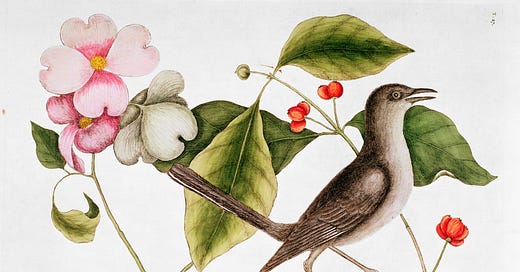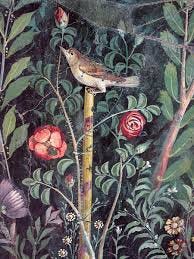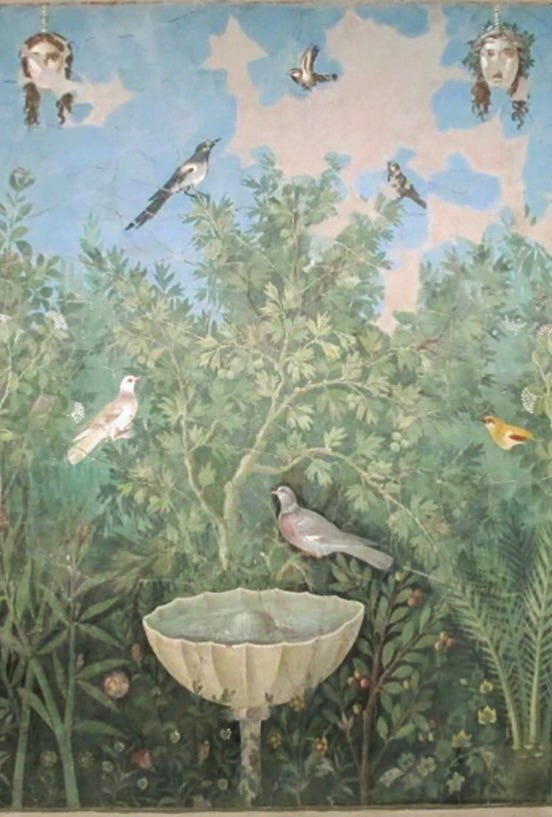Having broached the subject of “voice” last week, I thought I would share a three-part lecture I’ve delivered a couple times touching the ways I’ve attempted to vary the voice of the poets I’ve translated. This is part I:
This talk began life as a title, initially with little ambition beyond offering a sort of idiosyncratic guided tour through a few representative selections from the Penguin Book of Greek and Latin Lyric Verse, published a year ago this month. (The paperback is now available in the UK!) My feeling is that, in translation, if not also in poetry writ large, voice is a problem, and a product, of technique—a claim which I believe makes me a bona fide anti-Romantic, otherwise known as a classicist.
With that disclaimer out of the way, I’ll begin with an epigram translated from the New Posidippus:
Ἀρσινόη, σοὶ τἠ[ν]δε λύρην ὑπὸ χειρ[ὸς ἀοιδο]ῦ
φθεγξαμ[ένην] δελφὶς ἤγαγ᾽ Ἀριόνιο[ς
ου … ελου[…]ας ἐκ κύματος ἀλλ᾽οτ[
κεῖνος αν[…]ς λευκὰ περᾶι πελά[γη
πολλαπο[…] τητι καὶ αἰόλα τῆι [
φωνῆι π[…]ακον κανον ἀηδον[This lyre that Arion used to play
his dolphin brought to you, Arsinoe.
He found it bobbing on the waves, past hope,
and (second act of salvage) scooped it up
to stir, when it made land safe on his tail,
the antiphon of every nightingale.
Arion was a semi-legendary Greek citharode whose musical prowess so enchanted nature that, when pirates made him walk the plank, a dolphin ferried him to safety on its back. Herodotus tells the story, as does an anonymous classical dithyramb, which Maurice Bowra believed to have been sung by a solo actor while a chorus of dolphins danced around him. I posted this translation a while back, but here it is again:
ὕψιστε θεῶν
πόντιε χρυσοτρίαινε Πόσειδον
γαιάοχ᾽ ἐνηκύμον᾽ ἀν᾽ ἅλμαν⋅
βραγχίοις δὲ περί σε πλωτοὶ
θῆρες χορεύουσι κύκλῳ
κούφοισι ποδῶν ῥίμμασιν
ἐλάφρ᾽ ἀναπαλλόμενοι, σιμοὶ
φριξαύχενες ὠκύδρομοι σκὐλακες, φιλὀμουσοι
δελφῖνες, ἔναλα θρέμματα
κουρᾶν Νηρείδων θεᾶν,
οὓς ἐγείνατ᾽ Ἀμφιτρίτα⋅
οἵ μ᾽ εἰς Πέλοπος γᾶν
ἐπὶ Ταιναρίαν ἀκτὰν ἐπορεύσατε
πλαζόμενον Σικελῷ ἐνὶ πόντῳ,
κυρτοῖσι νώτοις φορεῦντες,
ἄλοκα Νηρείας φλακὸς
τέμνοντες, ἀστιβῆ πόρον,
φῶτες δόλιοί μ᾽ ὡς ἀφ᾽ ἁλιπλόου γλαφυρᾶς νεὼς
εἰς οἶδμ᾽ ἁλιπόρφυρον λίμνας ἔριψαν.Sublimest of deities
Poseidon, Lord of the Sea's
populous womb, whose trident is all gold,
who have the whole planet to hold—
around you creatures of the ocean
ply their circle dance that swims,
gills flashing, with a darting motion,
lightly on their finny limbs;
and slick-necked pups with blunt round noses,
quicksilver dolphins, lovers of the Muses, 10
Amphitrite's oceanic kids,
nurslings of the goddess Nereids.
Thanks to you I managed to escape
when I was bobbing aimlessly
in the swells off Sicily,
and you took me up on your arching backs
and ploughed the ocean's wavy plain
through furrows free from human tracks
and set me down again
in Pelops' country, on Taenarus's cape, 20
after double-dealing men
from the seaworthy hollow ship hurled me
into the bruise-dark billows of the sea.
It was this Arion, then, whose lyre, according to Posidippus, one of the same dolphins who had saved him found floating at sea and carried to Alexandria. The country’s nightingales greeted the bequest with a carillon of praise.
That these nightingales of Alexandria are either the scholar-poets of the library—that “Birdcage of the Muses,” as Timon of Phlius called it, mockingly—or, perhaps, their poems, seems clear enough. In one of his most famous epigrams, Callimachus refers to the poems of his friend Heraclitus in just this way. I’ll quote the version of the translation in the book; see this post for a different stab at it:
εἶπέ τις Ἡράκλειτε τεὸν μόρον, ἐς δέ με δάκρυ
ἤγαγεν, ἐμνήσθην δ᾽ ὁσσάκις ἀμφότεροι
ἥλιον ἐν λέσχηι κατεδύσαμεν: ἀλ̀λὰ σὺ μέν που
ξεῖν᾽ 'Αλικαρνησεῦ τετράπαλαι σποδιή:
αἱ δὲ τεαὶ ζώουσιν ἀηδόνες, ἧισιν ὁ πάντων
ἁρπακτὴς Ἀίδης οὐκ ἐπὶ χεῖρα βαλεῖ.When I heard, Heraclitus, you were dead
I thought of all the suns we’d talked to bed
those nights, and the tears came. Dear guest, I know
that you were ashes long and long ago,
and yet your nightingales are singing still:
Death kills all things, but them he cannot kill.
Two centuries or so earlier Bacchylides had called himself the ‘nightingale of Ceos.’ In 468 BCE, one year before Hieron of Syracuse was to die, Bacchylides had praised Hieron’s greatest triumph, a victory in the four-horse chariot race at Olympia—the same victory Pindar had prayed for at the end of Olympian 1, seemingly seeking the honor, and honorarium, which in the event Bacchylides received. Yet Bacchylides’ poem had to temper its jubilation, since by now Hieron was dying of kidney stones. Bacchylides’ poem therefore paints Hieron a picture of the vicissitudes of royal life, conjuring Croesus on his pyre after Sardis had fallen to the Persians; in Bacchylides’ telling, Apollo swoops in and spirits the Lydian king off to the land of the Hyperboreans, in thanks for lavish offerings made by Croesus at Delphi. Bacchylides’ poem ends:
φρονέοντι συνετὰ γαρύω⋅ βαθὺς μεν
αἰθὴρ ἀμίαντος⋅ ὕδωρ δὲ πόντου
οὐ σάπεται⋅ εὐφροσύνα δ᾽ ὁ χρυσός⋅
ἀνδρὶ δ᾽ οὐ θέμις, πολιὸν π[αρ]ένταγῆρας, θάλ[εια]ν αὖτις ἀγκομίσσαι
ἥβαν. ἀρετᾶ[ς γε μ]ὲν οὐ μινύθει
βροτῶν ἅμα σ[ώμ]ατι φέγγος, ἀλλὰ
Μοῦσά νιν τρ[έφει.] Ἱέρων, σὺ δ᾽ ὄλβουκάλλιστ᾽ ἐπεδ[είξ]αο θνατοῖς
ἄνθεα⋅ πράξα[ντι] δ᾽ εὖ
οὐ φέρει κόσμ[ον σι]ω-
πά⋅ σὺν δ᾽ ἀλαθ[είαι] καλῶν
καὶ μελιγλώσσου τις ὑμνήσει χάριν
Κηίας ἀηδόνος.The sense I speak shall find its way Str. 7
to the mind primed to understand.
The deeps of air may not be stained;
sea-water may not fester and decay;
gold thrills and pleases; but to slough
our winter of senescence offand come again to the green glade Ant. 7
of youth when our manhood commenced
the law is adamant against.
Yes, but the light of greatness does not fade 130
as bodies do; the Muses’ power
still tends the blaze. The fairest flowerof blessing, Hieron, Ep. 7
you’ve shown to everyone.
But silence will not shout
the owed adornment out
for excellence, and as men tell
your true deeds, they will hymn as well
my gift of honeyed harmony, and hail
the Cean nightingale. 140
Bacchylides looked forward to the reperformance of his ode in symposia to come, when both Hieron’s achievements and his own, reflected in the verbal and musical architecture of the ode itself, would be recalled and revivified for future generations.
But let us return to Posidippus. Arion’s delphine (if not Delphic) spirit animal carries his lyre to Alexandria, stirring a response from the country’s nightingales. Whether those nightingales are better thought of as Alexandria’s poets (in the manner of Bacchylides) or their poems (like those of Callimachus’ friend Heraclitus), it seems clear that Arion’s lyre represents the Greek musical and poetic inheritance of which the Museum’s scholar-poets were curators and continuators. Or, to put it more plainly, Hellenistic poetry is a literary response to the mostly oral Hellenic poetry being amassed and edited in the Birdcage of the Muses. Of the poems presented so far, Bacchylides’ ode and Arion’s dithyramb may serve as representatives of the late Archaic / Classical tradition to which the Alexandrians Posidippus and Callimachus respond.
Yet unnoticed among these Old World choruses of luscinia megarhinchos, or common European nightingales, a New World interloper has insinuated himself—the mimus polyglottos, ‘multilingual mimic,’ otherwise known as the North American mockingbird. Neither bird is much to look at—the nightingales are a drab brown with a bit of red on the tail and a buff underbelly, the mockingbirds a nondescript combination of grayish blues and whites, like a purposely dull avian bureaucrat. Both birds are night-singers—indeed, this is what nightingale means in English, galan being the old English verb ‘to sing’, though it sounds like it belongs in the proverbial dark and stormy night of Bulwer-Lytton, the kind of night when dirty deeds get done at great cost in a Thracian wood. Darkling we listen to the nightingale’s crisp, flute-like tone, modulated through single, plaintive, piercing calls, or rapid, laser-like runs of chirps and trills. It is otherwise with the mockingbird: first, he tries an angry, derisive squawk, then immediately blows his whistle, to call a foul; facing traffic, he turns on his siren; seeing a mark (a pigeon), he affects a come-hither lisp. And those are just a few notes in his repertoire. He’s a flying Foley artist, a sacred wood-in-one, and he needs to be, if he’s going to imitate rarissimae aves, those rarest of birds, like Bacchylides and Callimachus, Archilochus and Sappho, Catullus and Ovid, and make them sound more like themselves than like him.
How should he go about doing that? How can one drab passerine pencil-pusher compass within his own narrow pipes the immense vocal range of Greco-Roman lyric poets? Without claiming either that to do so is possible or that I have done it, I’d like to spend the rest of this piece considering different kinds of poems in the anthology and how I’ve tried to tune each one to make it sound more like its author and different from the others. My idea, as previously mentioned, is that voice in translation is best approached as a problem and product of technique. The first element to consider is poetic ‘form’: by this I mean, in reference to the original, the meter and unit or units of composition (stichs, distichs, strophes), and in the English translation, the use of meter, stanza and rhyme. Second is the way the syntax moves through those units, a consideration which touches on questions of closure and openness, end-stopping and enjambment, and the manipulation of caesuras. Third, we have the general register of diction and tone as dictated by a sort of ‘bird’s eye view’ of the poem and poet and their broad place in the tradition, and an admittedly subjective sense of the kinds of sounds that are most appropriate to this kind of poem. Considered in this way, “form” becomes the first line of defense against monotony; syntax is second; diction and sound are third.
One thing I as mockingbird tried to do is create and use consistent English analogies (meters and stanzas) for specific Greco-Roman stichs or strophes. This approach starts to emerge from the poems quoted so far: the two Alexandrian epigrams, both composed in Greek elegiac couplets, are translated into heroic couplets in English. Arion’s dithyramb, a nonce monostrophe, is given in an unpredictably rhymed and metered verse paragraph along the lines of (Matthew Arnold’s) “Dover Beach” or (Robert Frost’s) “After Apple Picking.” By contrast with Arion, the complex musical architecture of Bacchylides’ triadic epinician has been rendered into two different ‘metaphysical’-style nonce stanzas: strophes and antistrophes are given as six-line stanzas rhyming abbacc, with tetrameter in every line but the fourth, which is pentameter, while the epode is an expanding octet, rhymed in couplets, whose first four lines are trimeter, growing in the third couplet to tetrameter, then in the fifth line to pentameter, and then contracting again in the sixth back to trimeter. Of course, this combination of strophe / antistrophe / epode is employed throughout the translation of the ode. (I hope that anyone who bothers comparing the nonce stanzas I use for Bacchylides with my Pindaric ones will find that lines and rhymes in Bacchylides tend to be shorter and simpler—more tetrameter and trimeter, more couplets and quatrains—while in Pindar there are more longish lines (pentameter plus) and more complex, interwoven rhyme schemes: a formal way of contrasting Bacchylides’ easy-flowing, limpid and lucid style with Pindar’s gnarled and knotty, thorny sublimity.)
So much for form. If we consider my second ‘line of defense,’ syntax, I hope the following observations will seem justified. Bacchylides’ syntax is complex and flowing, heavy with caesuras and enjambment (of both the interlinear and interstanzaic varieties). My own version uses the mid-line caesura a bit less than his Greek—too many caesuras in English would compromise the songlike limpidity I take as essential—but I hope the syntax seems appropriately sinuous. Contrast with Arion’s dithyramb. There the sentences, while not short, sit much more easily in their lines, and the caesuras are few and light. The poem is consequently simpler, less self-conscious, less dazzling.
Callimachus and Posidippus contrast in a similar way. In Posidippus, the use of enjambment is fairly ‘unmarked’—it’s more or less the kind of smoothly ‘correct’ sentence-to-line relationship one expects from ‘typical’ verse of the period—while in Callimachus, the expressive enjambments contribute a lot to the effect of the poem: the strong spillover on ἤγαγεν, suggesting a spontaneous overflow of tears, the heavy (bucolic) diarhesis after κατεδύσαμεν, which to me feels, mournfully, like an end—not of the poem, which, like Heraclitus’ nightingales, continues, but of the lively pleasure of friendship. The fourth line expands elegantly, with two words neatly filling each half of the pentameter (a typical elegant effect, achieved also by Posidippus), while the enjambment in the final couplet on ὁ πάντων ἁρπακτὴς dangles ‘all things’ before our eyes only to have Death greedily snatch them away. In the translation, I hope the heavy caesura in the middle of line 3 (following a rhythmical pyrrhic spondee) gives a feeling of finality, while the smoothness of the last three lines offers a more serene and confident denouement to the emotional clottedness of the first three. (Of course, I was also contending with William Johnson Corey’s famous rendering: “They told me, Heraclitus, they told me you were dead;” his is the better poem, but mine has the Callimachean virtue of brevity, requiring only six pentameters, in contrast to his eight hexameters / fourteeners.)
(In her review of the book, Victoria Moul complains that I was not able to catch the enjambment on ὁ πάντων // ἁρπακτὴς in the Greek. I have been thinking about that ever since, but this is the best I’ve been able to do so far:
When I heard, Heraclitus, you were dead,
I thought of all the suns we’d talked to bed
those nights, and the tears came. Dear guest, although
the ashes claimed you many years ago,
your nightingales are singing still: for all-
silencing Death cannot suppress their call.
My final ‘line of defense’ is diction. The light ‘dithyrambic’ style of Arion’s song, with its buildup of epithets in lines like ‘σιμοὶ φριξαύχενες ὠκύδρομοι σκὐλακες, φιλόμουσοι δελφῖνες’ strikes me as fun and playful, which I tried to reproduce with some of the more goofy word choices: “finny,” “pups,” “kids,” “bobbing.” Bacchylides, by contrast, is getting offstage with one last flight to the heights, to which I felt poeticisms like ‘the deeps of air’ and Latinisms like ‘our winter of senescence’ and ‘adamant’ were appropriate. I am particularly proud of that rhyme on ‘commenced / against’ landing Bacchylides’ high-flown, rather gorgeous statement of a banal truism—you can’t grow young again. I hope the rhyme provides some of the emphasis lost when I fail to replicate Bacchylides’ strong enjambment on ἥβαν.
There isn’t much to say about diction in Posidippus vs. Callimachus; both poems are largely unmarked in that respect. One exception in Posidippus is Ἀριόνιο[ς, the “Arionian” dolphin, an Alexandrianism of a sort I typically ignore; here, however, I did manage to sneak in a high-toned word, “antiphon,” which I hope seems a sort of grace note and commentary on Alexandrian poetry as a whole. A playful poet elsewhere, Callimachus here employs a simple emotionality that called for a verbally chaste, largely monosyllabic attack—though in the published version at any rate I do allow myself a few emotive flourishes like “long and long ago,” and the syntactical inversion on ‘them he cannot kill’, both of which recall Corey. I hope that, while in some way I certainly could not explain all of these poems may sound like me, none of them sounds very much like each other, even when the form (as in Posidippus’ and Callimachus’ epigrams) is identical. Robert Frost claims, somewhat facetiously, that "the object in writing poetry is to make all poems sound as different as possible from each other.” As a primary motivation for writing poetry, this is sort of like putting up a sign that says “Do not throw rocks at this sign,” but it was also one of my major aims in this translating this book.








